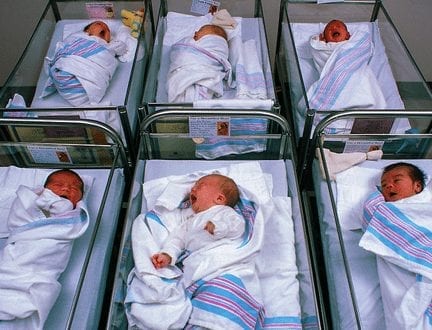
Throughout November we’re taking an in-depth look at Ruth, the little book that helped pave the way for God’s Messiah to come into the world.
Is it wise and good to bring a child into this world?
For most of human history, that question answered itself. Of course it’s wise and good to help fill the world with little ones – girls and boys whose stories will become part of the whole human story.
For millennia, large families were considered normal. And urgent. Until a few centuries ago, as many as half of the world’s children did not reach their sixth birthday. Families that grew the world’s crops and provided the bulk of its physical labor needed an ever-growing number of young helpers.
But recent revolutions in technology, healthcare, and agriculture have forever changed the expectation that humanity needs lots more children just to survive.
With seven (going on eight) billion residents currently on the planet, many citizens of so-called Developed Nations – which tend to be more secular in philosophy and outlook – are passing up the opportunity to become parents. Demographers have noted, for instance, that live births have been declining precipitously in almost all European nations for the past 40 years.
The “total fertility rate” of a nation or group of people is the estimate of the number of babies that a hypothetical group of 1,000 women will have over the course of their lives. In order to sustain its current population, a nation needs a fertility rate of 2.0 – two children to replace their parents. According to recent data, most Developed Nations are slowly but surely going out of existence. Whereas Britain stands at a respectable 1.86, Switzerland lags at 1.57 and Japan at 1.38. South Korea’s fertility rate is an astonishingly low 1.09. Germany and Italy have offered huge tax breaks to couples willing to have children, but most young adults are hoping their neighbors will be the ones who will step up and endure the inconveniences of parenting.
The United States’ 2017 fertility rate of 1.87 reflects the lowest number of children born in our country since the mid-1980s. Today there are 24.6 million Americans under the age of 6 – the same total as 1962. Sixty years ago, however, that number represented 13% of our population. Today it’s a mere 7%.
What’s behind the baby bust?
According to a recent edition of The Week, 39% of Americans in their teens and twenties are hesitant to bring a child into a world that might be headed for a climate apocalypse. Although some observers predicted a pandemic pregnancy surge, just the opposite seems to have happened: Since the early days of 2020, the desire to have children has declined by 17%. Some “anti-natalists” embrace the acronym THINKER: Two Healthy Incomes No Kids Early Retirement.
Behind the data there’s also one more factor.
Sociologists have long known that people who believe in God have significantly higher fertility rates.
Religious people tend to have an inherent conviction that life is a good gift to be received, not a sentence to be endured. If God is God, we have good reasons for believing that every life, whether short or long, has meaning. Human history is going somewhere. Being part of it should fill us with wonder.
That being said, parenting is not for cowards. The author Nora Ephron suggested that parents of teenagers should get a dog. That way someone will always be glad to see them when they come home.
But bringing a child into the world – not to mention fostering or adopting or mentoring or teaching or coaching – is never, by God’s grace, in vain.
The book of Ruth ends with a spectacular vision of hope. And it’s all about a child.
Boaz joyfully purchases Elimelech’s estate and marries Ruth. They soon become parents of a little boy. “Then Naomi took the child in her arms and cared for him. The women living there said, ‘Naomi has a son!’ And they named him Obed. He was the father of Jesse, the father of David” (Ruth 4:16-17).
Naomi, who had once pictured herself as empty and bitter and abandoned by God, is now the happiest grandmother in Israel. Not only that, she turns out to be the great-great-grandmother of Israel’s greatest king.
No one could have guessed it at the time, but Obed – this Bethlehem newborn – will be part of the genealogy of a little boy who will come into the world 1100 years later in the same town.
Obed’s birth has never been celebrated with special songs, candlelit worship services, and year-end sales at Kohl’s. But he came into the world riding a wave of hope. His birth was welcomed as proof that God had not overlooked the cries and prayers of two women – Ruth and Naomi – who had found themselves drowning in what seemed like an ocean of hopelessness.
Every child who enters this world comes the same way.
Every girl and boy rides on a wave of hope – not because of particular parents or grandparents or fortuitous circumstances, but because God is the giver of life and hope.
It is wise and good to bring children into God’s world.
And his world becomes a richer place every time a new little one takes their first breath.
